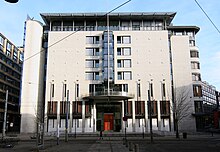| Oslo District Court | |
|---|---|
| Oslo tingrett (formerly: Oslo byrett) | |
 Oslo District Court is located in Oslo Courthouse | |
 | |
| 59°54′56″N 10°44′29″E / 59.9156150°N 10.74144268°E | |
| Established | 1 Jan 1867 |
| Jurisdiction | Oslo |
| Location | Oslo, Norway |
| Coordinates | 59°54′56″N 10°44′29″E / 59.9156150°N 10.74144268°E |
| Appeals to | Borgarting Court of Appeal |
| Website | Official website |
Oslo District Court (Norwegian: Oslo tingrett) is a district court located in Oslo, Norway. This court is based at the Oslo Courthouse in the city of Oslo. The court serves the entire city of Oslo and the court is subordinate to the Borgarting Court of Appeal.[1][2] As the largest district court in Norway, it handles about 20% of all cases in the country. The court handled 3,000 criminal and 2,200 civil cases, as well as 7,200 summary proceedings in 2007.[3]
It is led by a chief justice (sorenskriver), and has 100 appointed professional and deputy judges. These are divided into eight sections. In addition, the court has 105 administrative employees, of which 30 are in central administration, 59 in judicial-related jobs and 16 in security. These are led by a managing director.[3] The court is a court of first instance. Its judicial duties are mainly to settle criminal cases and to resolve civil litigation as well as bankruptcy. The administration and registration tasks of the court include death registration, issuing certain certificates, performing duties of a notary public, and officiating civil wedding ceremonies. Cases from this court are heard by a combination of professional judges and lay judges.[4]
Oslo is the most frequent user of interpreters of all the courts in the country, accounting for about half the use of interpreters. The most frequent languages are Arabic, English, Somali and Polish. In 2007, 23% of all cases used interpreters. The court also has a witness support program in cooperation with Oslo Red Cross.[3]
Starting in 1999, the court initiated a court conciliation program to encourage negotiations in civil cases. This allows the parties to find a middle ground they are both satisfied with, without creating winners and losers. At the same time, time and costs are reduced. In 2007, 18% of civil cases participated in the program, and of these 74% settled through the program.[3]
- ^ "Om Oslo tingrett" (in Norwegian). Oslo tingrett. Retrieved 22 February 2022.
- ^ "Forskrift om inndelingen av rettskretser og lagdømmer". Lovdata.no (in Norwegian). 12 April 2021. Retrieved 22 February 2022.
- ^ a b c d Norwegian National Courts Administration. "The Oslo District Court" (in Norwegian and English). Retrieved 31 January 2009.
- ^ Gisle, Jon, ed. (14 February 2022). "Tingrett". Store norske leksikon (in Norwegian). Kunnskapsforlaget. Retrieved 22 February 2022.